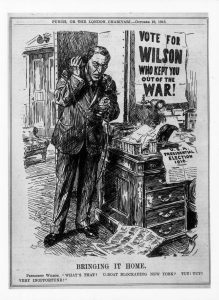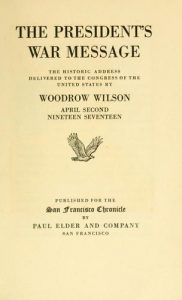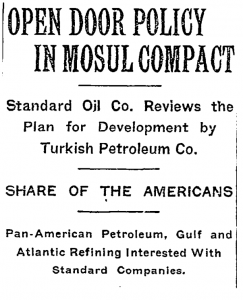“Bringing it Home”, The London Charivari (1916)

This source is a political cartoon published in the London Charivari satirical magazine in 1916, a month before Woodrow Wilson’s reelection and the entrance of the United States into World War I. The cartoon depicts Wilson standing in his campaign office on the phone, with a poster on the wall saying “Vote for Wilson who kept you out of war”. In the caption, Wilson’s dialogue is specified, as he says, “What’s that? U-Boat blockading New York? Tut tut! Very inopportune!” Criticizing Wilson’s cautious approach to World War I in his campaign, the author of this cartoon is arguing that German conflict with America is inevitable and that Wilson only stands for American neutrality to be reelected, and once an “inopportune” event takes place, like the one described in Wilson’s dialogue, the United States will have valid enough of a reason to join the war.
“War Message to Congress”, excerpt of a speech given to Congress by Woodrow Wilson (1917)

In this excerpt of a speech given to Congress in 1917, Woodrow Wilson asks for a declaration of war against Germany. Wilson characterizes the American mission in the war as altruistic and idealistic, asserting that “We [Americans] have no selfish ends to serve. We desire no conquest, no dominion…” While it’s true that the United States was not poised to gain territorially as a result of the war, it would be disingenuous to say there was nothing else to be gained from winning. Wilson was interested in expanding American markets abroad, and the Middle East and its oil abundance was particularly enticing with the Ottoman Empire on the verge of complete collapse. This source also follows the common theme of the United States hiding its imperialist ambitions by using liberal language to represent itself as a protector of democracy. For example, towards the end of the speech, Wilson declares, “…we shall fight for the things which we have always carried nearest our hearts—for democracy, [and] for the rights and liberties of small nations…”
“Open Door Policy in Mosul Compact”, New York Times (1926)

This New York Times article published in 1926 covers a resolution regarding the open door policy in Mosul and American access to its oil fields. Following the collapse of the Ottoman Empire, the victors of World War I were all eager to close in on Iraqi oil fields to expand their empire, so to compromise the oil fields were divided up evenly between the powers, with each getting 25 percent. This may be seen in retrospect as a reason for America’s joining of WWI, as it is unlikely they would have been included in this deal otherwise. It is also interesting that despite joining the war only a year before it ended, the US was given the same percentage of oil access as the other powers, who suffered much worse casualties than America. This source again characterizes American imperialism as motivated by the expansion of markets and economic growth.
